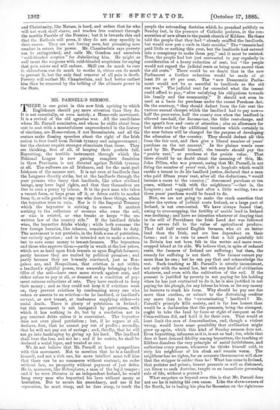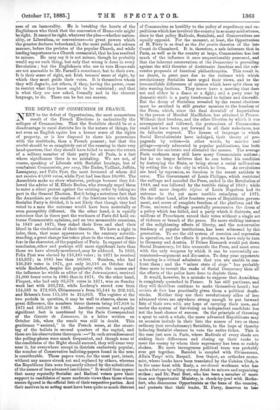MR. PARNELL'S SERMON,
frHERE is one point in this new Irish uprising to which J. Englishmen should pay more attention than they do. It is not essentially, or even. mainly, a Heine-rule movement. It is a revival of the old agrarian war. All the candidates whom Mr. P.arnell nominates, and whom he shifts about from seat to seat with a masterfulness unprecedented in the.history of elections, are Home-rulers, if riot Secessionists, and all the orators make flaming speeches about the right of the Irish nation to free itself from British tyranny and misgovernment ; but the electors require stronger stimulants than these. They are thinking, first of: all, of keeping their pockets full. B'oycotting, the terrible instrument- through which the National. League is now gaining complete dominion in. three Provinces, is. not. direeted against British tyranny at al/. The sufferers are all Irishmen, and for the most part Irishmen of the meaner sort. It is not even at landlords that the Leaguers directly strike, but at the landlords through the poor persons who fancy that landlords, like other civilised beings,_may have legal rights, and that they themselves are free to earn a penny by labour. It is the poor man who takes a vacant farm, or buys grass off it, or drives cattle to market from it, or sells goods to any one who does these things, whom the boycotter tries to ruin. Nor is it the Imperial Treasury which the boycotter is striving to coerce. It matters nothing to the collectors of revenue who owns the soil, or who is evicted, or who breaks or keeps- "the nix- written law of the country side." If the landlord drinks wine, the boycotter drinks whisky ; while both consume the few foreign luxuries, like tobacco, remaining liable to duty. The movement is not patriotic, in. the Irish sense of patriotism, but entirely agrarian ; and is intended not to make a nation, but to save some money to tenantrfarmers. The boycotters and those who approve them—partly in. wrath at the low prices, which are as hard upon Irish tenants as upon English farmers; partly because they are exeited by political promises ; and partly because they are honestly convinced, just as Ben- galees are, and Neapolitans, that eviction is not within a landlord's rightful power, true ownership belonging to the tiller, of the soil—have once more struck against rent, and -either refuse to pay at all, or demand as a condition of pay-. ment ruinous reductions of rate. They have resolved to keep their money ; end as they could not keep it if evictions went on, they prevent evictions by condemning every one who orders or assents to an eviction—be he landlord, or landlord's servant, or new tenant,, or tradesman supplying either—to social death. There is plenty of patriotism in Ireland ; but this movement is not instigated by patriotism, with which it has nothing to do, but by a resolution not to pay contract debts unless it is convenient. The boycotter does not even plead patriotism ; but, if he argues at all, declares, first, that he cannot pay out of profits ; secondly, that he will not pay out of savings ; and, thirdly, that he will not go into bankruptcy by giving up his land. The landlord shall bear the loss, and not he ; and if he resists, he shall be declared a social leper, and treated' as one.
We do not believe that Mr. Parnell at heart sympathises with this movement. Not to mention that he is a landlord himself, and not a rich one, his mere intellect must tell him that there can be no commerce without contract, no order without law, no prosperity without payment of just debts. Re is, moreover, like Robespierre, a man of the legal temper ; and if he were Dictator in an independent Ireland, he would hang every man who boycotted his laws without mercy or hesitation. Bat to- secure his ascendancy, and use it for separation, he must stoop, and he does stoop, to teach the
people the astounding doctrine. which. he preached publicly on Sunday last, in the presence of Catholic prelates, at the con- secration of new altars in the-pasish church of-Kildare. He-there told the people that they had-" already snaffled the landlord, but would- now put a curb in their mouths." The "tenants had paid little or-nothing this year, but the landlords had entered into a conspiracy to make- them pay," and it- must be resisted. True, the people had but just contracted to pay regularly in consideration of a heavy reduction of rent, but "the people would not-regard the judicial rents as being-more sacred than the old rents." There could be no doubt that in the new Parliament a further reduction would be. made of at least 30 or 40 per cent. The "new Democratic Portia,. meat would not be as merciful to landlords as the old • one-was." The judicial rent far exceeded what the tenant could afford to pay, "after satisfying his obligations towards his family and the community.' It should not even be, used as a basis' for purchase under the recent Purchase Act. On the-contrary, "they should. deduct from the fair- rent the- various annual charges-which the landlord had to pay now.— half' the poor-rates, half the county ems when the landlord- is allowed one-half, the Income-tax, the tithe rent-charge, and the agent's fees and costs of attention ; also an allowance for bad debts and the additional taxation which certainly in the near-future will be- charged for the purpose of developing: the- education of- the-country: They should deduct all this.. from the fair rent, and then give a liberal number of -years!, purchase on the net amount." In the plainer words. once, used by Mt. Parnell himself, the tenants should pay. the- " prairie rent," or purchase at the. prairie value. That there should be no doubt about the meaning of- this, Mr. John- Dillon, who was present, seeing that Mr. Parnell, in not filing the number- of years' rent, left- a loophole which would enable a tenant to do his landlord justice, declared that a raan. who- paid' fifteen years' rent, after all the deductions, "would become a curse to the country;" denounced- purchase at tea years, without "talk with the neighbours."—that is, the Leaguers ; and suggested that after a little waiting, two or three years' purchase would be found to do.
Now, we are not going• to make the stock assertion that under the system of judicial. rents Ireland, or a large part of • Ireland, is- not over-rented. We have always. feared that; owing to over-cropping; the fertility of' arable land in Ireland-- was declining ; and have no intention whatever of denying that in the will of- Providence. the Irish Land Act was followed by a severe- fall in the value of agricultural produce. That fall half ruined English farmers, who sit on better- land than the Irish, and are less dependent- on their farms ; and it is: vain to assert. that a fall painfully felt in Britain has not been- felt in the wetter and more over- -cropped' sland at its side. We believe -that, in spite of reduced rents, the farmers of Ireland are suffering.; but then, the remedy for suffering is not theft. The farmer cannot pay more than he. can ; but he can pay that and acknowledge the rest. Such- teaching as Mr. Parnell's is utterly inconsistent, not only with the moral law, but with any kind of-civilisation whatever, and even with the cultivation of the soil. If the peasant is justified by poverty in not paying for his' holding when he has just contracted to do it, he is also justified in not paying for his plough, for any labour he hires, or for any money he borrows to stock his farm. Why should he pay one due more. than another, or submit to the distraining creditor any more than to the "exterminating" landlord ? Mr. Parnell's principle kills society, and' is far less honest than would be a declaration that the peasants, being the strongest; ought to take the land by force or right of conquest as the Cromwellians did, and hold it for their own. That would at least limit the area of demoralisation, and, though a violent 'wrong, would leave some possibility that civilisation might grow up again, which this kind of Sunday sermon does not. Even- boycotting, infamous as it is, is not so bad ; for, while that does at least demand fidelity among boycotters, the teaching at Kildare dissolves the very principle of social faithfulness, and authorises every person, whenever, he thinks himself cold, to strip his neighbour of his cloak- and remain warm. The neighbour has no rights, for an aeourate thermometer will show that the stripper is- colder than he ! What has come to Ireland, that prelates and priests, honest peasants as well as dishonest, can listen to. such doctrine, taught as an immediate governing rule oflife, without a protest ? What surprises us beyond even this is that Mr. Parnell does not see he is ruinittg his own cause. Like the slave-owneraof the South, he is basing. his plea for Secession on. the righteous-.
ness of an immorality. He is breaking the hearts of the Englishmen who think that the concession of Home-rule might be right. It cannot be right, whatever the plea—whether nation- ality, or Liberalism, .or convenience—to grant powers which the grantee declares beforehand, in the most public and solemn manner, before the prelates of the popular Church, and while lending importance to a Church ceremonial, that he has resolved to misuse. He may say it is not misuse, though he probably would say no such thing, but only that wrong is done in every Revolution; but the Englishmen who are to vote Home-rule are not amenable to Mr. Parnell's conscience, but to their own. It is their sense of right, not Irish tenants' sense of right, by which they must guide their votes. It is themselves whom they will degrade, not others, if they, having the power, cease to restrict what they know ought to be restricted ; and that is what they are now asked, formally and in the clearest language, to do. There can be but one answer.



































 Previous page
Previous page